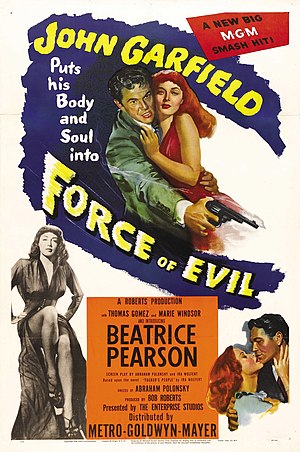Force of Evil
Jump to navigation
Jump to search
| Force of Evil | ||||||||||||||||||||||||||||
|---|---|---|---|---|---|---|---|---|---|---|---|---|---|---|---|---|---|---|---|---|---|---|---|---|---|---|---|---|
This film has been preserved in the National Film Registry in 1994.
| ||||||||||||||||||||||||||||
 | ||||||||||||||||||||||||||||
|
Force of Evil is a 1948 American crime film noir starring John Garfield and directed by Abraham Polonsky. It was adapted by Polonsky and Ira Wolfert from Wolfert's novel Tucker's People.
Why It Rocks
- The film was mostly ignored when MGM released it as the bottom half of a double bill, but its reputation grew over the years as a masterpiece of postwar American noir. The film's influence is apparent for directors like Francis Ford Coppola and Martin Scorsese. (Coppola's The Godfather also looks into gangsters in terms of their business practices)
- Polonsky said that in his script for the film, "[his] early New York life and [his] thrashing about in Hollywood came together in a personal and political way".
- Although the film's budget was too small for expensive sets or improvisation, this doesn't harm the overall product, with its location shots in New York City. An off-hours shot of Garfield staggering through a deserted Wall Street district has an eerie tone, along with shots on the Hudson River waterfront, and the George Washington Bridge hulking in the background.
- John Garfield provides an elaborate performance as crooked lawyer Joe Marsh, who uses a flood of words to distract himself and others from the moral implications of his actions. Joe Marsh embodies the gnawing guilt and disdain for conventions that would become mainstays of rebel actors in the following decade. It's a brave performance typical of an actor wanting to remain true to his beliefs.
- Interesting, yet cynical storyline where Joe Marsh and mobster want to take over the numbers racket, bankrupting operations by fixing a number everyone plays on the Fourth of July. Except, Joe's brother Leo runs one of the operations, and Leo simply wanted to get Joe an education and didn't want any part in the crime Tucker represents.
- The clash between Joe and Leo Marsh serves as the film's driving force (complete with a number of Cain and Abel allusions), rather than the romantic subplots involving Leo's secretary and Tucker's wife, or the explicit criticism of an economic system that makes such corruption inevitable.